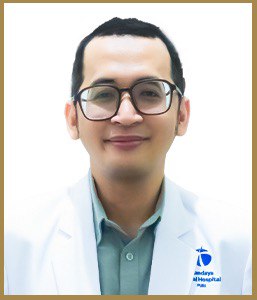Persistent muscle pain that doesn’t go away may indicate various conditions—from neuromuscular disorders and overworked muscles to viral or bacterial infections and chronic muscle diseases. Without proper treatment, this condition can significantly interfere with daily activities.
If the persistent muscle pain is caused by a neuromuscular disorder, Mandaya Royal Puri Hospital has expert doctors to treat it, including dr. Luh Ari Indrawati, Sp.N, Subsp. E.N.K.(K) and dr. Nurul Fadli, Sp.N.
Contents
Causes of Persistent Muscle Pain You Should Watch Out For
1. Neuromuscular Disorders
Neuromuscular disorders occur when the nerves fail to communicate properly with the muscles. This can cause problems such as muscle spasms, nerve pain, and muscle atrophy due to lack of nerve stimulation.
Some neuromuscular diseases are chronic and progressive, meaning the symptoms worsen over time. Patients often require long-term therapy to maintain muscle strength and optimal function.
2. Chronic Muscle Disease (Myopathy)
Chronic muscle disease or myopathy occurs when muscle fibers are damaged by inflammation or autoimmune reactions. Examples include chronic myositis and muscular dystrophy.
In this condition, the immune system mistakenly attacks the body’s own muscle tissues, leading to weakness, stiffness, and fatigue. If left untreated, chronic muscle disease can severely restrict movement and daily activities.
3. Muscle Strain from Overuse
One of the most common causes of persistent muscle pain is overuse or muscle strain. Muscles that are overworked without enough rest may experience microtears or small injuries.
This is common among people who exercise too intensely, perform heavy physical work, or repeat the same motion continuously (repetitive strain injury). Proper rest, stretching, and nutrition are essential for full recovery.
4. Viral and Bacterial Infections
Certain viral and bacterial infections can also lead to widespread muscle pain. When the body fights infection, the immune system triggers inflammation that can affect muscle tissues.
This condition is usually temporary, such as during the flu, but in some severe or prolonged infections, inflammation can persist and cause long-lasting pain. Maintaining a strong immune system and promptly treating infections are crucial to prevent complications.
5. Traumatic Injuries
Traumatic injuries from accidents or sports can damage muscles. A hard impact may cause a muscle contusion (bruise), while overstretching can lead to a muscle strain (tear).
If not properly treated, damaged muscles may develop scar tissue and lead to chronic pain. Rehabilitation, physiotherapy, and heat or cold therapy are usually required for optimal recovery.
6. Chronic Pain Syndrome
Conditions like fibromyalgia and chronic fatigue syndrome can cause widespread muscle pain without direct muscle injury. These conditions are often linked to abnormalities in how the nervous system processes pain signals.
Patients may experience extreme fatigue, sleep disturbances, and persistent body pain. Because of the complex causes, treatment typically involves a combination of physical therapy, sleep management, and stress reduction.
7. Medication Reactions
Some medications can cause muscle pain as a side effect. For example, vaccines may trigger temporary mild pain resembling infection, while cholesterol-lowering drugs (statins) can cause muscle damage in some people.
Sudden discontinuation of certain medications can also cause temporary muscle pain as the body adjusts. If muscle pain occurs after taking a new medication, consult your doctor for dose adjustment or a safer alternative.
When to See a Doctor for Muscle Pain
Contact your doctor immediately if you experience:
- Severe muscle pain accompanied by redness or swelling in the affected area
- Pain lasting more than a week without a clear cause
- Additional symptoms like fever, fatigue, or signs of infection that don’t improve after a week
- Chest pain, chest pressure, irregular heartbeat, or shortness of breath (these could indicate a heart attack — seek emergency medical help immediately)
Early medical evaluation can help identify the exact cause of persistent muscle pain and prevent serious complications.
Neuromuscular Specialists at Mandaya Royal Puri Hospital
1. dr. Luh Ari Indrawati, Sp.N, Subsp. E.N.K.(K)

dr. Luh Ari Indrawati is a neurologist and clinical neurophysiology consultant specializing in neuromuscular diseases (muscle and nerve disorders) and epilepsy.
She earned her medical and neurology degrees from the Faculty of Medicine, Universitas Indonesia, and completed her Fellowship in Neuromuscular Diseases at the National Center of Neurology and Psychiatry, Tokyo, Japan.
As a Clinical Neurophysiology Consultant from the Indonesian Neurology College and a Qualified Electroencephalographer certified by the ASEPA-ASNA EEG Examination Board (Singapore), she has extensive expertise in handling conditions such as myasthenia gravis, muscular dystrophy, neuropathy, multiple sclerosis, Parkinson’s disease, and dementia.
Her approach focuses on precise neurophysiological examinations to ensure accurate diagnoses and personalized, targeted treatments for each patient.
Clinic schedule at Mandaya Royal Puri Hospital:
- Thursday: 2:00 PM – 6:00 PM
- Saturday: 2:00 PM – 6:00 PM
2. dr. Nurul Fadli, Sp.N

dr. Nurul Fadli is a neurologist and graduate of the Faculty of Medicine, Universitas Indonesia, with extensive experience diagnosing and treating disorders of the brain, spinal cord, and muscles.
He is skilled in electromyography (EMG) and electroencephalography (EEG) — two vital tests for detecting nerve disorders accurately.
His expertise covers a wide range of neurological conditions, including stroke, Parkinson’s disease, migraine, epilepsy, neuropathy, and memory disorders like dementia.
His treatment approach focuses on nerve rehabilitation and functional recovery, helping patients regain their independence and improve their quality of life.
Clinic schedule at Mandaya Royal Puri Hospital:
- Monday: 6:00 PM – 8:00 PM
- Wednesday: 6:00 PM – 8:00 PM
- Friday: 5:00 PM – 8:00 PM
To make your visit to Mandaya Royal Puri Hospital easier, use the Chat via WhatsApp, Book Appointment, or Care Dokter App, available on Google Play and the App Store, to check queue numbers and access complete information conveniently.



